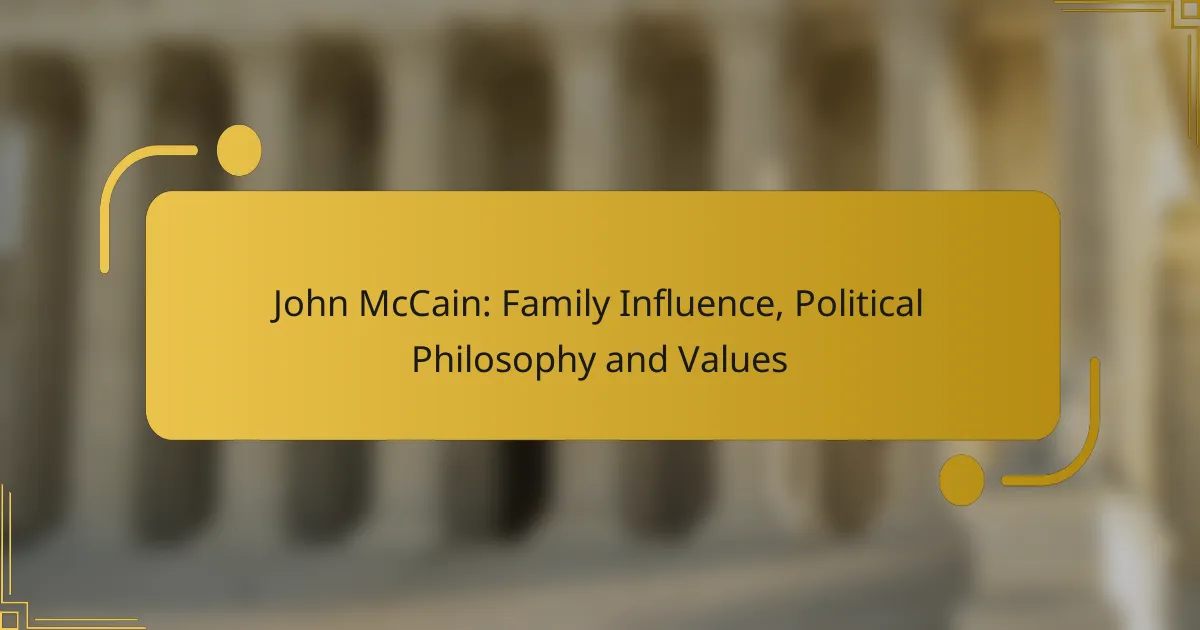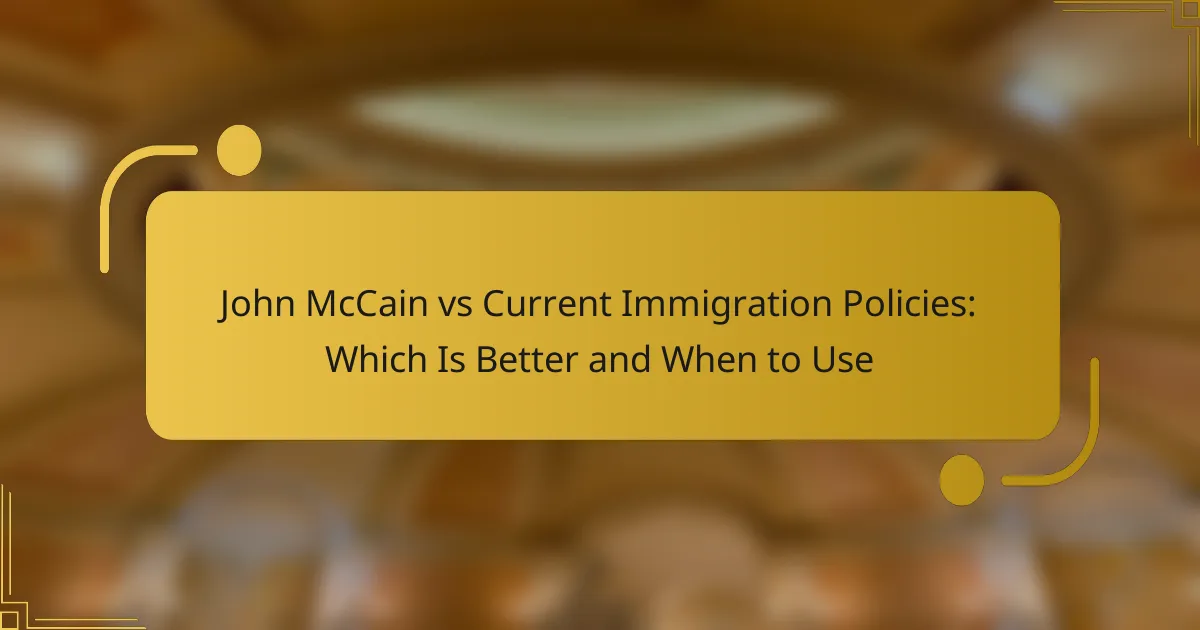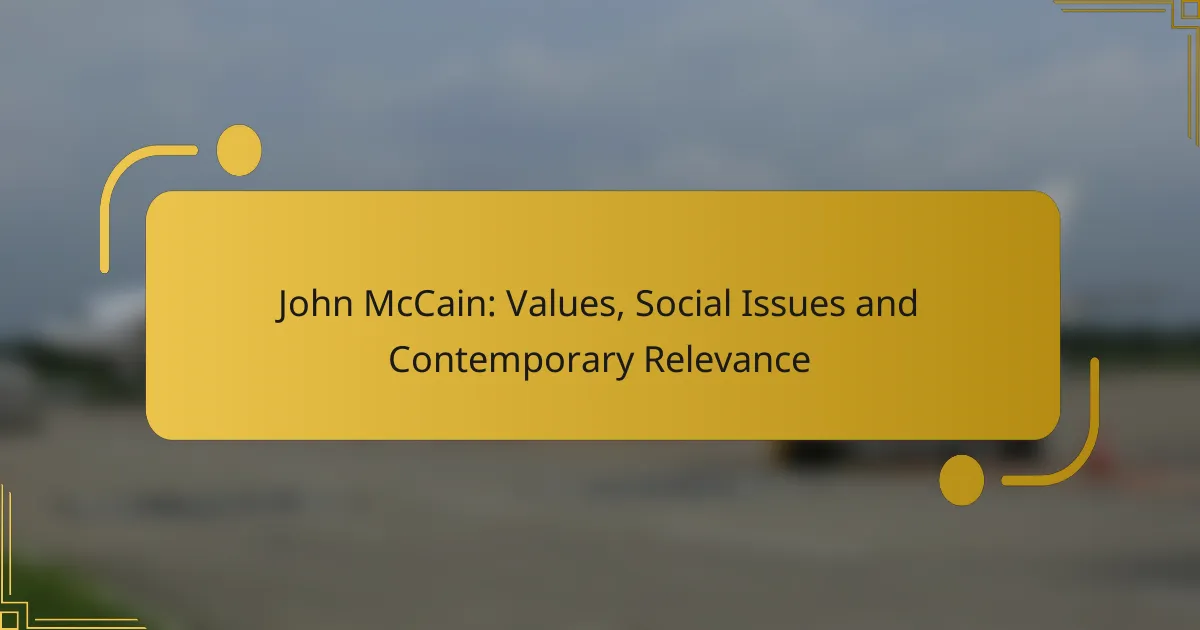John McCain’s political journey was deeply influenced by his family’s military background, which instilled in him values of service, leadership, and resilience. His political philosophy, rooted in bipartisanship, national security, and human rights, was shaped by his experiences as a prisoner of war and his extensive tenure in the U.S. Senate, reflecting a steadfast commitment to democratic ideals.

How did John McCain’s family influence his political career?
John McCain’s family played a significant role in shaping his political career, instilling values of service, leadership, and resilience. Growing up in a military family, he was influenced by the principles and experiences of his parents, which guided his approach to politics and public service.
Influence of his father, Admiral John S. McCain Jr.
Admiral John S. McCain Jr. was a prominent figure in the U.S. Navy and served as a key influence in John McCain’s life. His father’s military career and leadership during World War II and the Vietnam War instilled a sense of duty and honor in McCain. This legacy of service motivated him to pursue a career in politics, where he aimed to uphold the values his father exemplified.
Moreover, Admiral McCain’s experiences in leadership roles provided John with a model of how to navigate complex situations, which he later applied in his political endeavors. The emphasis on integrity and commitment to country became cornerstones of McCain’s political philosophy.
Impact of his mother, Roberta McCain
Roberta McCain was a strong and independent woman who greatly influenced her son’s character and values. Her resilience and advocacy for social issues inspired John to be a compassionate leader, attentive to the needs of his constituents. She often emphasized the importance of education and civic duty, which shaped his approach to public service.
Roberta’s active involvement in various community initiatives also encouraged John to engage with the public and understand their concerns. This connection to grassroots issues became a hallmark of his political career, as he often prioritized the voices of everyday Americans.
Role of his upbringing in a military family
Growing up in a military family, John McCain was immersed in a culture of discipline, sacrifice, and patriotism. This upbringing fostered a deep respect for the armed forces and a commitment to national service, which he carried into his political life. The values of loyalty and honor were instilled in him from a young age, influencing his decisions as a senator.
Additionally, the challenges faced by military families, including frequent relocations and the impact of war, provided McCain with a unique perspective on issues affecting veterans and active-duty service members. His personal experiences motivated him to advocate for policies that supported military families and addressed their needs in Congress.

What are the core values of John McCain’s political philosophy?
John McCain’s political philosophy is anchored in principles such as bipartisanship, national security, and human rights. These core values shaped his approach to governance and his interactions with both political allies and opponents.
Commitment to bipartisanship
McCain strongly believed in the importance of bipartisanship, advocating for collaboration between Democrats and Republicans to achieve common goals. He often crossed party lines to support legislation that he felt was in the best interest of the country.
This commitment was evident in his support for various initiatives, including campaign finance reform and immigration reform, where he worked alongside members of the opposing party. His approach encouraged dialogue and compromise, aiming to bridge the partisan divide.
Emphasis on national security
National security was a cornerstone of McCain’s political philosophy, shaped by his experiences as a naval officer and a prisoner of war. He consistently prioritized a strong military and robust defense policies to protect the United States and its allies.
McCain advocated for increased defense spending and a proactive foreign policy, believing that a strong military presence was essential for global stability. He often emphasized the need to confront threats from rogue states and terrorist organizations to ensure national safety.
Advocacy for human rights
Human rights advocacy was a fundamental aspect of McCain’s values, reflecting his belief in the dignity of all individuals. He championed the cause of oppressed people worldwide, often speaking out against authoritarian regimes and human rights abuses.
McCain’s commitment to human rights was evident in his support for international agreements and humanitarian efforts. He believed that promoting democracy and freedom was not only a moral obligation but also essential for global peace and security.

How did John McCain’s experiences shape his political beliefs?
John McCain’s political beliefs were profoundly influenced by his experiences, particularly his time as a prisoner of war, his lengthy service in the U.S. Senate, and the guidance of key political mentors. These elements combined to forge a philosophy that emphasized patriotism, bipartisanship, and a commitment to democratic values.
Prisoner of war experience in Vietnam
McCain’s five years as a prisoner of war in Vietnam had a lasting impact on his worldview and political philosophy. Enduring torture and isolation, he developed a deep sense of resilience and a commitment to honor and duty. This experience instilled in him a strong belief in the importance of human rights and the need to support veterans and their families.
His time in captivity also shaped his views on military intervention and foreign policy, leading him to advocate for a strong national defense and a proactive approach to global threats. McCain often emphasized that the sacrifices made by service members should never be forgotten or taken lightly.
Service in the U.S. Senate
During his tenure in the U.S. Senate, which spanned over three decades, McCain became known for his willingness to cross party lines and work with colleagues on bipartisan initiatives. He championed issues such as campaign finance reform and immigration reform, reflecting his belief in collaboration for the greater good. His legislative efforts often focused on promoting transparency and accountability in government.
McCain’s Senate service also reinforced his commitment to American values and international alliances. He consistently advocated for a robust foreign policy that prioritized democracy and human rights, believing that the U.S. had a moral obligation to support oppressed peoples around the world.
Influence of key political mentors
Throughout his career, McCain was influenced by several key political mentors who helped shape his beliefs and approach to governance. Figures like Senator Barry Goldwater instilled in him a strong sense of conservative principles, while others encouraged a more pragmatic approach to politics. This blend of influences contributed to his unique political identity.
Mentorship played a crucial role in McCain’s development as a leader, guiding him through complex political landscapes and helping him navigate challenges. He often credited these mentors with teaching him the importance of integrity, service, and the need to stand up for one’s convictions, even in the face of adversity.
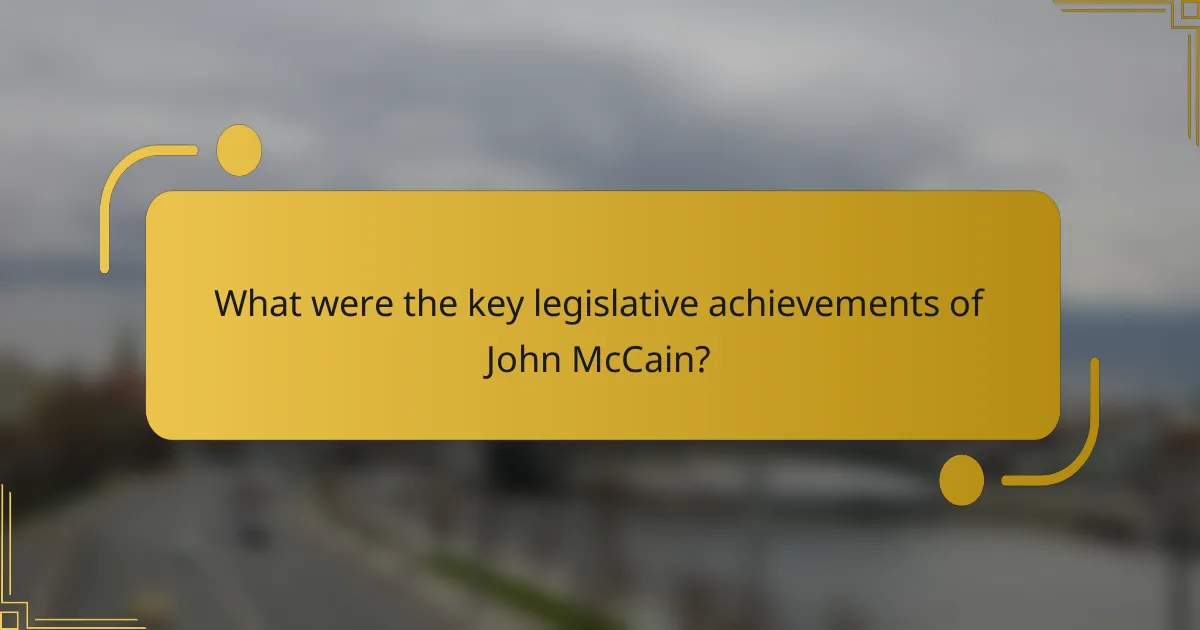
What were the key legislative achievements of John McCain?
John McCain’s legislative achievements reflect his commitment to reform and bipartisanship, particularly in campaign finance, healthcare, and veterans’ affairs. His work has had lasting impacts on these critical areas of American policy.
Campaign Finance Reform Act
The Campaign Finance Reform Act, also known as the McCain-Feingold Act, aimed to regulate the financing of political campaigns. Enacted in 2002, it sought to eliminate soft money contributions to political parties and introduced stricter limits on individual contributions.
This legislation was significant in promoting transparency and reducing the influence of money in politics. However, it faced challenges, including Supreme Court rulings that weakened its provisions, highlighting ongoing debates about campaign finance in the U.S.
Affordable Care Act opposition
John McCain was a prominent opponent of the Affordable Care Act (ACA), advocating for its repeal and replacement. He argued that the ACA led to increased premiums and reduced choices for consumers, emphasizing the need for a more market-driven approach to healthcare.
His stance was particularly evident during the Senate vote in 2017, where his decisive “no” vote played a crucial role in blocking the repeal efforts. This opposition underscored his belief in limited government intervention in healthcare.
Veterans Affairs reforms
McCain was a strong advocate for veterans’ rights and worked extensively on reforms within the Department of Veterans Affairs (VA). He pushed for legislation aimed at improving healthcare access and accountability for veterans, particularly following scandals regarding wait times and care quality.
His efforts led to the Veterans Access, Choice, and Accountability Act of 2014, which allowed veterans to seek care outside of the VA system if they faced long wait times. This reform aimed to enhance the quality of care and ensure veterans received timely medical attention.
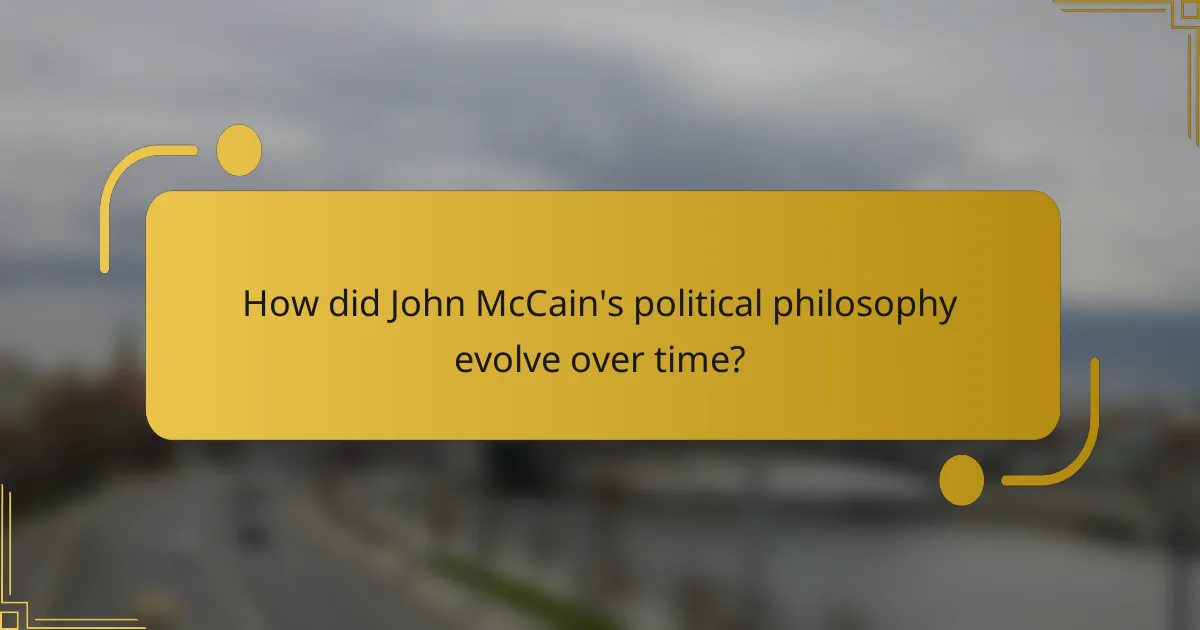
How did John McCain’s political philosophy evolve over time?
John McCain’s political philosophy evolved significantly throughout his career, reflecting a shift from staunch conservatism to a more moderate approach. This transformation was influenced by various factors, including changing political dynamics, public sentiment, and personal experiences.
Shift from conservative to moderate stances
Initially, McCain was known for his strong conservative views, particularly on issues like taxation and military spending. However, over time, he began to adopt more moderate positions, especially on social issues such as immigration and healthcare. This shift allowed him to appeal to a broader range of voters, particularly during his presidential campaigns.
For example, McCain’s support for comprehensive immigration reform in the mid-2000s marked a significant departure from the hardline stance favored by many in his party. His willingness to collaborate with Democrats on various issues demonstrated his evolving political philosophy.
Responses to changing political landscape
McCain’s political philosophy was also shaped by the changing landscape of American politics, particularly the rise of partisanship and polarization. He often positioned himself as a bipartisan leader, advocating for cooperation across party lines. This approach was evident in his efforts to work with both Republicans and Democrats on key legislation.
His response to the financial crisis in 2008, where he temporarily suspended his campaign to address the issue, showcased his commitment to national interests over political gain. This adaptability to the political environment underscored his evolving philosophy.
Influence of public opinion on his policies
Public opinion played a crucial role in shaping McCain’s policies and political philosophy. He was known to adjust his positions based on the sentiments of his constituents, particularly on contentious issues like climate change and military intervention. This responsiveness helped him maintain relevance in a rapidly changing political climate.
For instance, as public concern over climate change grew, McCain began advocating for environmental policies that aligned with the emerging consensus among voters. His ability to listen to and reflect public opinion was a hallmark of his political approach, illustrating his evolution over time.
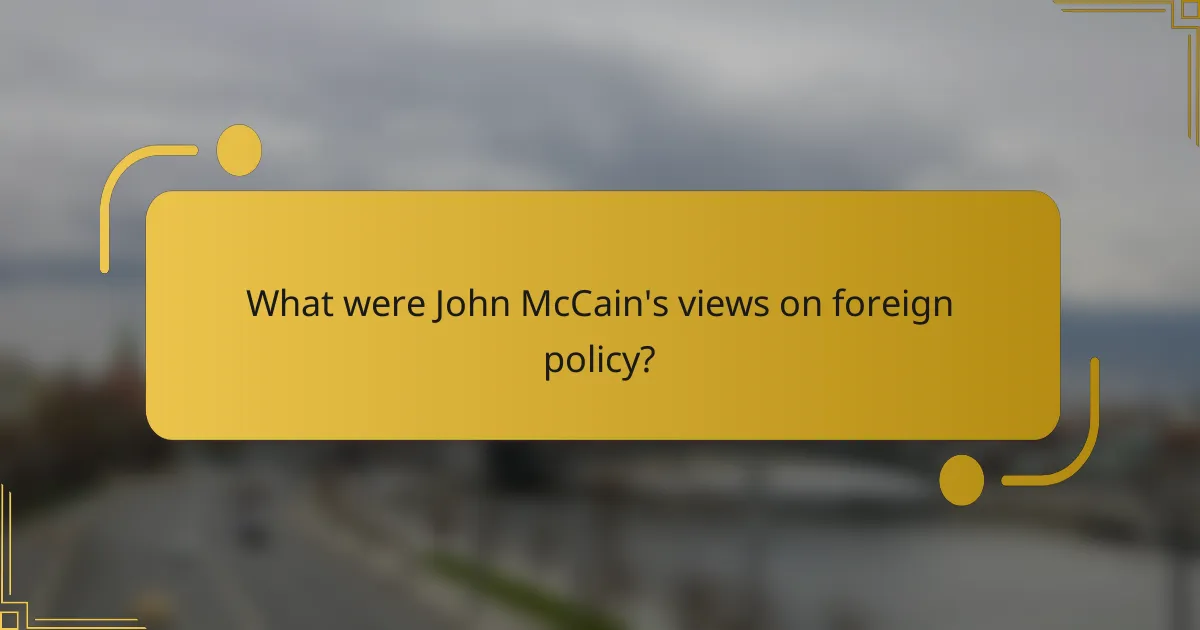
What were John McCain’s views on foreign policy?
John McCain’s foreign policy views emphasized a strong commitment to international alliances and a proactive stance on military intervention. He believed that the United States should play a leading role in global affairs, often advocating for a robust military presence to deter threats and support allies.
Support for NATO and international alliances
McCain was a staunch supporter of NATO and viewed international alliances as essential for maintaining global stability. He argued that collective defense mechanisms, such as those outlined in Article 5 of the NATO treaty, are crucial for deterring aggression from adversarial nations.
He frequently highlighted the importance of unity among Western nations, advocating for increased military spending among NATO members to ensure that all allies contribute fairly to collective security. McCain believed that strong alliances would enhance the United States’ influence and ability to respond to global challenges.
Stance on military intervention
John McCain favored military intervention in situations where he believed it was necessary to protect human rights or national interests. He often cited examples such as the conflicts in the Balkans and Libya, arguing that U.S. involvement was justified to prevent humanitarian crises and support democratic movements.
However, McCain also recognized the complexities of military engagement, advocating for clear objectives and a well-defined strategy. He warned against prolonged conflicts without a clear exit strategy, emphasizing the need for a balance between military action and diplomatic efforts to achieve lasting peace.
